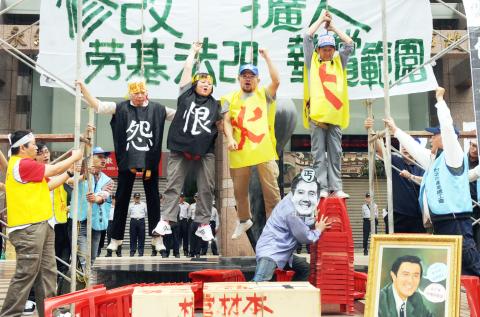Laid-off workers who were ordered by the Council of Labor Affairs (CLA) to repay retirement payouts given to them 16 years ago as loans yesterday launched a hunger strike in front of the council’s headquarters in Taipei, demanding it withdraw the lawsuits against the workers who did not pay and calling for a review of the Labor Standards Act (勞動基準法).
“We are not asking the council to do much, only to revise Article 28 of the Labor Standards Act. We are not asking you to do much, only to withdraw lawsuits against these laid-off workers,” Lai Hsiang-ling (賴香伶) spokeswoman of Raged Citizens Act Now told the crowd during a rally before the hunger strike started.
“Why is the government going after these elderly, retired workers who are mostly economically disadvantaged instead of chasing fugitives who have committed financial crimes that have a much larger impact on society?” she said.

Photo: Lo Pei-der, Taipei Times
Article 28 stipulates that unpaid salaries take priority in debt repayment after a company declares bankruptcy. However, activists and workers want retirement and severance payments to be added to the clause and be given the same degree of repayment priority.
She said that if the government does not respond positively to the protesters’ demands, unionists and activists would mull launching a large-scale strike.
Many factories in the textile or electronics industries closed in 1996, leaving hundreds of laid-off workers without retirement payouts or months of unpaid wages.
After a series of demonstrations, the council decided to give the laid-off workers retirement payouts as loans, and promised that it would ask the workers’ employers to repay the debts.
However, beginning last year, all workers who accepted the loans were asked to repay them, and those who are unable to repay them were sued by the council.
Lin Tzu-wen (林子文), one of the protesters, said he had taken part in a hunger strike in front of the council building 16 years ago.
“Twenty-eight hours into the hunger strike 16 years ago, council officials finally came out to negotiate with us, and eventually came up with the loan program,” Lin said. “Apparently the council lied to us about not asking us to repay, so here we are again.”
He added that by taking part in the hunger strike, he and his peers were turning their bodies into a channel of protest, “because we workers have nothing left but our bodies.”
The protest was largely peaceful. However, clashes broke out between the protesters and the police because the council would not allow the protesters to use the toilets inside the building.
Workers then set up their own temporary toilets using a large banner, plastic chairs and garbage bags.
However, when some protesters tried to use the toilets, police officers confiscated their equipment, and said the protesters were violating the Assembly and Parade Act (集會遊行法).
The police later agreed to help negotiate with the council to allow the protesters to use the toilets.

NATIONAL SECURITY THREAT: An official said that Guan Guan’s comments had gone beyond the threshold of free speech, as she advocated for the destruction of the ROC China-born media influencer Guan Guan’s (關關) residency permit has been revoked for repeatedly posting pro-China content that threatens national security, the National Immigration Agency said yesterday. Guan Guan has said many controversial things in her videos posted to Douyin (抖音), including “the red flag will soon be painted all over Taiwan” and “Taiwan is an inseparable part of China,” while expressing hope for expedited “reunification.” The agency received multiple reports alleging that Guan Guan had advocated for armed reunification last year. After investigating, the agency last month issued a notice requiring her to appear and account for her actions. Guan Guan appeared as required,

A Vietnamese migrant worker yesterday won NT$12 million (US$379,627) on a Lunar New Year scratch card in Kaohsiung as part of Taiwan Lottery Co’s (台灣彩券) “NT$12 Million Grand Fortune” (1200萬大吉利) game. The man was the first top-prize winner of the new game launched on Jan. 6 to mark the Lunar New Year. Three Vietnamese migrant workers visited a Taiwan Lottery shop on Xinyue Street in Kaohsiung’s Gangshan District (崗山), a store representative said. The player bought multiple tickets and, after winning nothing, held the final lottery ticket in one hand and rubbed the store’s statue of the Maitreya Buddha’s belly with the other,

‘NATO-PLUS’: ‘Our strategic partners in the Indo-Pacific are facing increasing aggression by the Chinese Communist Party,’ US Representative Rob Wittman said The US House of Representatives on Monday released its version of the Consolidated Appropriations Act, which includes US$1.15 billion to support security cooperation with Taiwan. The omnibus act, covering US$1.2 trillion of spending, allocates US$1 billion for the Taiwan Security Cooperation Initiative, as well as US$150 million for the replacement of defense articles and reimbursement of defense services provided to Taiwan. The fund allocations were based on the US National Defense Authorization Act for fiscal 2026 that was passed by the US Congress last month and authorized up to US$1 billion to the US Defense Security Cooperation Agency in support of the

CLASSIFIED BRIEFING: The ministry said the special budget focuses on building a comprehensive defense system and strengthening the domestic defense industry The Ministry of National Defense yesterday released information on seven categories of weapons systems to be procured under a stalled NT$1.25 trillion (US$39.57 billion) special defense budget, including precision artillery, long-range missiles, air defense anti-tank missiles and more than 200,000 uncrewed aerial vehicles (UAVs). The Executive Yuan approved a draft version of the budget on Nov. 27 last year and submitted it to the legislature for review. The legislature’s Foreign Affairs and National Defense Committee yesterday invited Minister of National Defense Wellington Koo (顧立雄) to deliver a classified briefing and answer questions at a closed-door session. Koo said he hoped to provide lawmakers